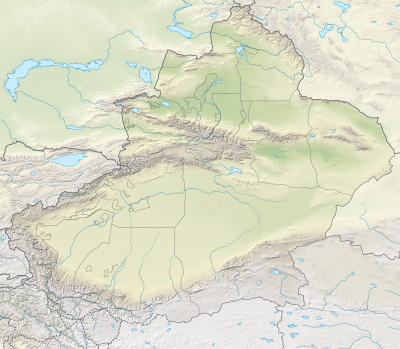Fuhai County
Fuhai County (Chinese: 福海县) as the official romanized name, also transliterated from Uyghur as Burultokay County (Uighur: بۇرۇلتوقاي ناھىيىسى; Chinese: 布伦托海县), is a county in the Xinjiang Uyghur Autonomous Region and is under the administration of the Altay Prefecture.[2] It has an area of 33,319.38 km2 (12,864.68 sq mi) with a population of 65,600.[2][1] The county's postcode is 836400.[1]
Fuhai County
福海县 · بۇرۇلتوقاي ناھىيىسى | |
|---|---|
.png.webp) Location of Fuhai County (red) within Altay Prefecture (yellow) and Xinjiang | |
 Fuhai Location of the seat in Xinjiang | |
| Coordinates (Fuhai County government): 47°06′43″N 87°29′12″E | |
| Country | People's Republic of China |
| Autonomous region | Xinjiang |
| Prefecture | Altay |
| County Seat | Fuhai (Town) |
| Area | |
| • Total | 33,319.38 km2 (12,864.68 sq mi) |
| Population | |
| • Total | 65,600 |
| • Density | 2.0/km2 (5.1/sq mi) |
| Time zone | UTC+8 (China Standard) |
| Postal code | 836400 |
| Fuhai County | |||||||||||
|---|---|---|---|---|---|---|---|---|---|---|---|
| Chinese name | |||||||||||
| Simplified Chinese | 福海县 | ||||||||||
| Traditional Chinese | 福海縣 | ||||||||||
| |||||||||||
| Alternative Chinese name | |||||||||||
| Simplified Chinese | 布伦托海县 | ||||||||||
| Traditional Chinese | 布倫託海縣 | ||||||||||
| |||||||||||
| Uyghur name | |||||||||||
| Uyghur | بۇرۇلتوقاي ناھىيىسى | ||||||||||
| |||||||||||
| Kazakh name | |||||||||||
| Kazakh | بۋرىلتوعاي اۋدانى
Kazakh Cyrillic: Бурылтоғай ауданы Kazakh Latin alphabet: Býryltoǵaı aýdany | ||||||||||
History
In 1921, the area was incorporated as Burultokay County, adapting the Kazakh endonym "Burultokay", meaning "colorful jungle".[2] The county was renamed as Fuhai County in 1942.[2]
Geography
The Altay Mountains run through Fuhai County, and the county's two main rivers which flow through the area the Ulungur River and the Ertix River (Irtysh).[2][1] Ulungur Lake is located in Fuhai County.[3]
Fuhai County is bordered by Mongolia to its northeast, Fuyun County to its east, Fukang City to its south, and by Jimunai County, Tacheng Prefecture, and Hoboksar Mongol Autonomous County all to its west.[2]
The county's elevation ranges from 386 to 3,332 m (1,266 to 10,932 ft) in height, with an average elevation of approximately 500 m (1,640 ft).[2]
Climate
The county has an average annual temperature of 4.7 °C (40.5 °F), with an extreme high temperature of 40.0 °C (104 °F), and an extreme low temperature of −42.7 °C (−45 °F).[2] The county, on average, goes 224 days of the year above 0 °C, 156 days without frost, has 2,908 annual hours of sunshine, and an annual precipitation of 131 millimeters.[2]
Administrative divisions
Fuhai County is directed divided into three towns, three townships, one township-level farm, one prison, and a number of areas administered by the Xinjiang Production and Construction Corps.[4]
Towns
Fuhai County's three towns are Fuhai, Kalamagai, and Jetaral.[4]
Townships
Fuhai County three townships are Kokagax Township, Qigandijie Township, and Arda Township.[4]
Prefecture Farm 1
Altay Prefecture Farm 1, a special township-level unit, is located in Fuhai County.[4]
Fuhai Prison
Fuhai Prison (福海监狱; 福海監獄) is a township-level prison located in Fuhai County.[4]
Xinjiang Production and Construction Corps
The Xinjiang Production and Construction Corps operates its 182nd Regiment, 183rd Regiment, 187th Regiment, and its 188th Regiment within Fuhai County.[4]
Demographics
Of the county's 65,600 people, 31,800 (48.4%) of the county's population is Han Chinese, 30,000 (45.7%) of the county's population is Kazakh, and the remaining 3,800 (5.9%) of the population belong to the county's other 30 ethnic groups, which include the Hui and Uighur people.[2]
Economy
Fuhai County has 1.2 million acres of cultivated land and 23 million acres of grassland, and is the home of the Altay Sheep.[2] In 2013, the county was named the camel milk capital of China.[2] Aquaculture is also present in the county, particularly in Ulungur Lake.[3]
The county is home to a number of natural resources, including oil, natural gas, iron ore, spodumene.[2] The county's proven natural gas reserves total 105.3 billion cubic meters, and the county's oil reserves are more than 11 million tons.[2] Geologic surveys exploring the county's copper, lead, zinc, gold, beryllium, lithium, niobium, tantalum, rubidium, cesium, and muscovite have been conducted.[3] Clay has also been mined in Fuhai County since the 1980s.[3]
Hongshanzui Port, a land border crossing with Mongolia, is located within Fuhai County.[3] The county government has announced efforts to improve the crossing's poor infrastructure in order to expand commerce through the crossing.[3]
Transportation
China National Highway 216 and China National Highway 218 both run through the county.[1] Xinjiang Provincial Highway 318 and Xinjiang Provincial Highway 324 also run through the county.[2]
The Kuytun–Beitun railway passes through Fuhai County.[2]
Culture
Kazakh culture is prevalent in Fuhai County due to its large Kazakh population, particularly Kazakh dastans, Kazakh embroidery, Kazakh yurts, and a number of horse-related traditions unique to Kazakh culture.[5]
Starting in 1988, the county government began undertaking research regarding dastans in the hope of preserving them.[5] In 1992, the county government archived four volumes of dastans, totaling 340,000 words.[5]
References
- 福海县概况地图. xzqh.org (in Chinese). 2014-11-07. Archived from the original on 2020-06-03. Retrieved 2020-06-03.
- 福海概况 (in Chinese). Fuhai County People's Government. 2017-07-18. Archived from the original on 2020-06-03. Retrieved 2020-06-03.
- 优势资源 (in Chinese). Fuhai County People's Government. Archived from the original on 2020-06-03. Retrieved 2020-06-03.
- 2019年统计用区划代码. stats.gov.cn (in Chinese). 2019. Archived from the original on 2020-06-03. Retrieved 2020-06-03.
- 民族风情 (in Chinese). Fuhai County People's Government. 2013-07-23. Archived from the original on 2020-06-03. Retrieved 2020-06-03.